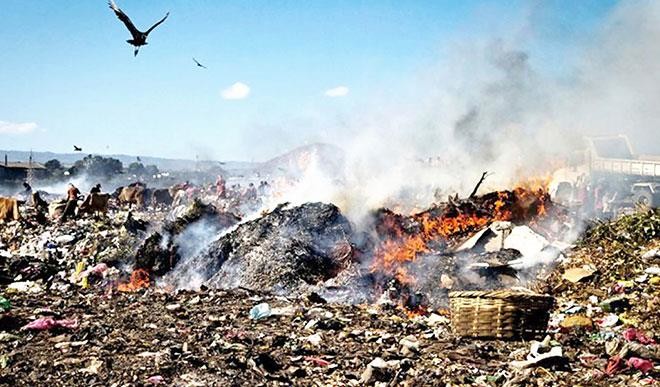A peep into Abuja environmental board’s open-burning practice
The Abuja Environmental Protection Board (AEPB), a regulatory body saddled with the responsibility of protecting and managing the Federal Capital Territory (FCT)’s environment, has strayed in its activities by engaging in open burning. It is a common sight in the FCT for AEPB staff on enforcement exercise to chase street hawkers in a bid to […]


The Abuja Environmental Protection Board (AEPB), a regulatory body saddled with the responsibility of protecting and managing the Federal Capital Territory (FCT)’s environment, has strayed in its activities by engaging in open burning.
It is a common sight in the FCT for AEPB staff on enforcement exercise to chase street hawkers in a bid to keep them away from selling in the streets of Abuja.
However, this action usually results in the seizure of goods from the hawkers and sometimes those caught are charged to a mobile court.
Daily Trust checks reveal that the action of chasing and arresting hawkers has taken another dimension, as some AEPB staff now engage in burning goods and illegal structures erected by the hawkers, an action considered dangerous to the environment.
The agency has always been in the forefront to raid spots where hawkers and petty traders mount illegal stands to carry out their business activities in the FCT but engaging in open burning is a misplacement of the function of the Act establishing agency.
The AEPB Act No. 10 of 1997 has listed some functions for it among which are to conserve the environment and its natural resources for the benefit of present and future FCT generations and to minimise the impact of physical development on the territory’s ecosystem.
By this provision, the board’s engagement in open burning contradicts the Act that gives it its powers.
Recently, a national television reported that staff of the AEPB in a bid to carry out sanitation set ablaze some commodities seized from some hawkers at AYA within the FCT.
In the report, a food vendor whose goods were among those set ablaze, said all her food items were thrown onto the street and set ablaze leaving her at a loss.
A witness condemned the action by the agency and accused it of failure to do what was right. The witness said most of the staff used in perpetrating the act were reckless and could not interpret the law but act out of ignorance.
He also questioned the credibility of the mobile court established by the agency to fine hawkers arrested.
A similar incident happened recently near Utako village where structures by the roadside were set ablaze.
The open burning of such items, which is indulged in so much in the FCT, according to experts, is very harmful to the people’s health and the environment because it releases hazardous mixture of cancer-causing compounds and other toxic substances into the atmosphere.
The action, which is common in the rural areas, has found its way into the city, and shows the seeming helplessness of the government and its agencies in the environmental malaise.
However, the National Environmental Standards and Regulations Enforcement Agency (NESREA) in its Act – the ‘National Environmental (Control of Bush/Forest Fire and Open Burning) Regulations, 2010. S. I. No. 15’ – says it is to prevent and minimise the destruction of the ecosystem through fire outbreak and burning of any material that may affect the health of the ecosystem through the emission of hazardous air pollutants.
On what NESREA is doing to address the situation, the Chief Press Secretary, Sule Oyofo, said the agency was partnering with relevant stakeholders to address the issue of open burning.
He said institutions like the National Drug Law Enforcement Agency (NDLEA), Customs and the Standards Organisation of Nigeria (SON) that sometimes engaged in mass burning of products were their biggest partners in addressing the problem.
Oyofo, however, said the agency was putting programmes on ground to ensure compliance of the law against open burning.
Reacting, the Public Relations Officer of the Abuja Environmental Protection Board (AEPB), Samuel Musa, said the board didn’t burn materials confiscated from street hawkers.
He said the items were used as exhibit during their prosecution, “but if it is the wood that they construct they are removed and cleared away,” he explained.
“We don’t really burn structures, all that we do is to remove and sanitise the place.
“You know all the nuisance they constitute some of those things cannot be packed away,” he said.
On concern where there is smoke that could be harmful to residents, he said: “Not at all. It should not be exaggerated, we are concerned with the health of the residents as well. Where we have heaps we remove and pack with pick-ups but where it is minimal we clear it.”
